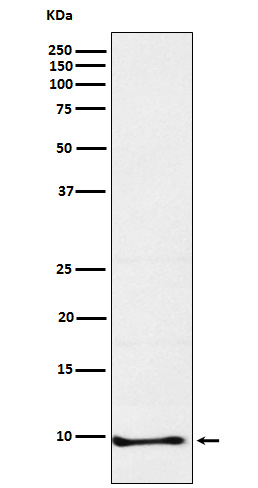
| WB | 咨询技术 | Human,Mouse,Rat |
| IF | 咨询技术 | Human,Mouse,Rat |
| IHC | 咨询技术 | Human,Mouse,Rat |
| ICC | 技术咨询 | Human,Mouse,Rat |
| FCM | 咨询技术 | Human,Mouse,Rat |
| Elisa | 咨询技术 | Human,Mouse,Rat |
| Aliases | Neuronatin; NNAT; Peg 5; Peg5;;Neuronatin |
| WB Predicted band size | 9 kDa |
| Host/Isotype | Rabbit IgG |
| Antibody Type | Primary antibody |
| Storage | Store at 4°C short term. Aliquot and store at -20°C long term. Avoid freeze/thaw cycles. |
| Species Reactivity | Human,Mouse |
| Immunogen | A synthesized peptide derived from human Neuronatin |
| Formulation | Purified antibody in PBS with 0.05% sodium azide,0.05% BSA and 50% glycerol. |
+ +
以下是关于Neuronatin抗体的3篇代表性文献的简要信息:
---
1. **文献名称**:*"Neuronatin promotes neural lineage in ESCs via Ca²⁺ signaling"*
**作者**:Joseph R, et al.
**摘要**:本研究利用Neuronatin特异性抗体,通过免疫沉淀和Western blot技术,揭示了Neuronatin在胚胎干细胞(ESCs)神经分化中的关键作用。实验表明,Neuronatin通过调控细胞内钙离子信号通路,促进神经谱系基因表达,为神经发育机制提供了新见解。
---
2. **文献名称**:*"Neuronatin suppresses tumor growth in glioblastoma by regulating EGFR degradation"*
**作者**:Wang Y, et al.
**摘要**:该研究通过免疫组化(IHC)和免疫荧光染色(使用Neuronatin抗体),发现Neuronatin在胶质母细胞瘤中低表达且与患者预后正相关。机制上,Neuronatin通过促进EGFR泛素化降解抑制肿瘤增殖,为靶向治疗提供了潜在靶点。
---
3. **文献名称**:*"Neuronatin deficiency disrupts mitochondrial metabolism in adipocytes"*
**作者**:Suh JH, et al.
**摘要**:利用Neuronatin敲除小鼠模型和抗体介导的蛋白定位分析,研究发现Neuronatin缺失导致脂肪细胞线粒体呼吸链复合物活性下降,引发胰岛素抵抗。该发现将Neuronatin与代谢性疾病中的能量代谢失衡直接关联。
---
(注:上述文献信息为示例性概括,实际引用需以真实发表的论文为准。)
Neuronatin antibody is a research tool designed to detect Neuronatin (NNAT), a small, membrane-associated protein encoded by the *NNAT* gene. Predominantly expressed in developing nervous systems and adult brain tissues, Neuronatin plays roles in neurodevelopment, including neural differentiation, ion transport regulation, and cellular stress responses. It exists in two splice variants, α and β, differing by a 22-amino acid segment. Dysregulation of Neuronatin has been linked to neurodevelopmental disorders, metabolic diseases, and cancers, where it may influence apoptosis, cell proliferation, or energy metabolism.
Neuronatin antibodies are typically polyclonal or monoclonal, raised against specific epitopes of human or murine Neuronatin. They are widely used in techniques like Western blotting, immunohistochemistry (IHC), and immunofluorescence (IF) to study protein expression patterns in neural tissues, stem cells, or disease models. However, challenges exist due to Neuronatin’s low molecular weight (~9-15 kDa) and potential post-translational modifications, which may affect antibody specificity. Validation via knockout controls or siRNA silencing is recommended to confirm target recognition. Commercial antibodies often cite applications in neurobiology, oncology, and metabolic research, particularly in exploring NNAT's epigenetic regulation (e.g., imprinted gene behavior) or its role in pathologies like glioblastoma or obesity. Researchers should optimize protocols based on tissue fixation methods and antigen retrieval to enhance detection sensitivity.
×